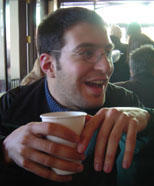Goodbye Kass
Just got back from the conference. There (over a lot of wine) I had an extremely interesting conversation with Elizabeth Blackburn, of UCSF about the role of scientists in the political process. Spurred on by a belief that people in the scientific community should be involved so that they "get the science right" she joined the President's Bioethics council. But many in the pannel seemed to have their mind made up before any discussion started, and many others were not used to rigorous scientific debates, taking the criticisms personaly. Sounds familiar? If you can't get the facts straight, and don't attemp to learn from your peers what is the point of discussing the ethical consequences? As I've stated before, it's tough being in the scientific community - the best scientists are those that understand the nature of lively scientific debate. Unforetunately certain public pundits (i.e. ideologues) maskerading as intelectuals don't understand this and comfort eachother's egos by claiming that the criticisms are unfair. What they don't get is that criticism is of vital importance, and that it's only through a critical inspection of your assumptions/ideas/models that scientific advance is made. Eventually Dr Blackburn was not asked to return and this upset many in the scientific community, but by excluding her and thus debate, the Pannel made itself less relevant.
If you haven't heard Leon Kass is steping down as head of the council. I hope that this will precipitate a change in the chemistry of this vital council - but as I've said in the past I'm not hopeful.
If you haven't heard Leon Kass is steping down as head of the council. I hope that this will precipitate a change in the chemistry of this vital council - but as I've said in the past I'm not hopeful.


<< Home